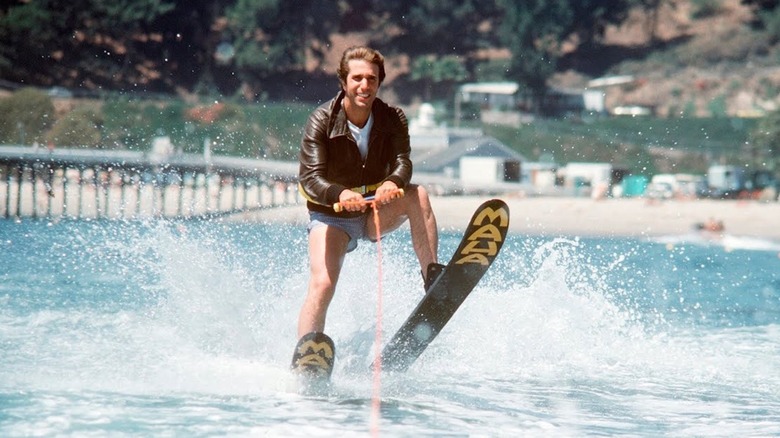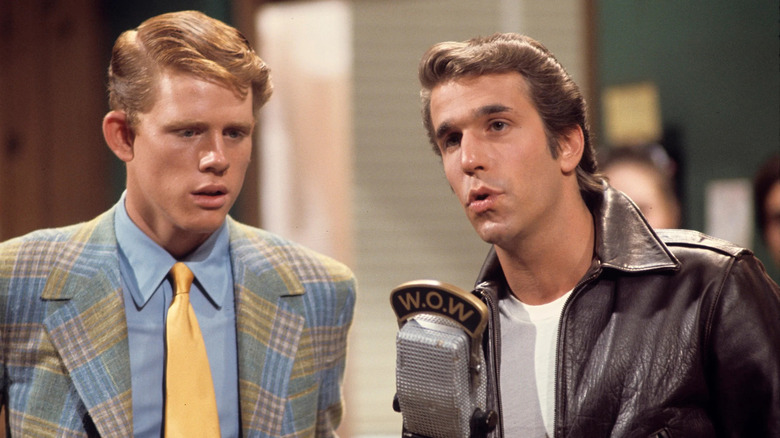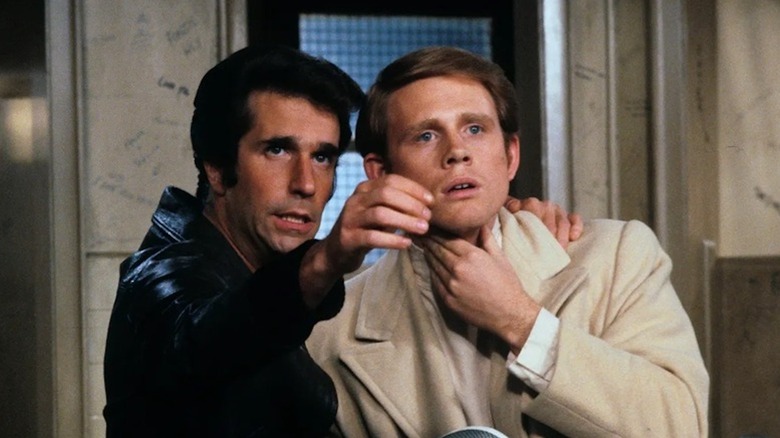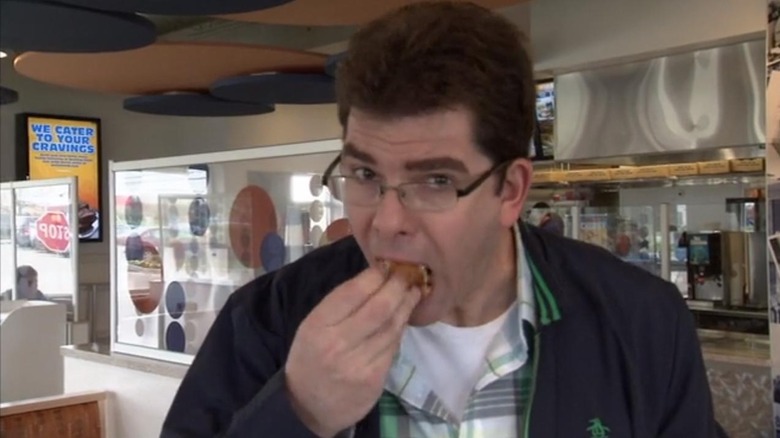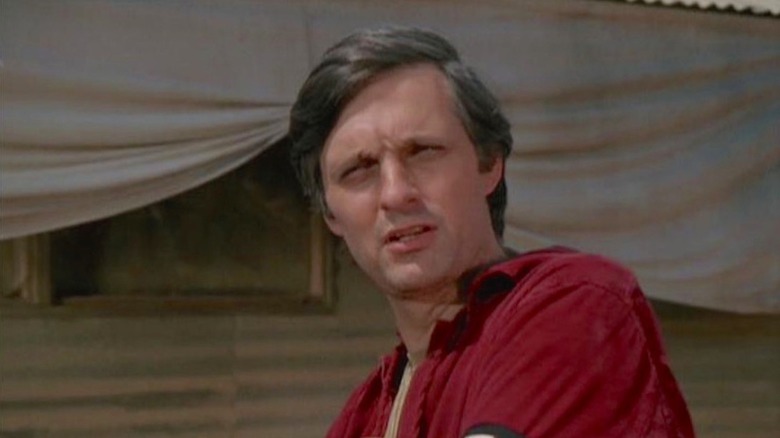Jumping The Shark: The Meaning & Happy Days Origin Of The Popular Phrase
When a television series becomes a full-fledged hit, creatively and/or commercially, a great deal of pressure is immediately placed on its showrunner, writers, and producers to keep their audience engaged. The trick for these creatives is to give viewers more of what they love while also keeping the show from growing stale — but how to go about this has changed drastically over the years, particularly for sitcoms.
When people tuned into series like "The Dick Van Dyke Show," "The Odd Couple," and "The Bob Newhart Show," they weren't eagerly anticipating the next chapter in an ongoing narrative as they did/do with modern sitcoms like "Arrested Development," "Curb Your Enthusiasm," and "Georgie & Mandy's First Marriage." While those older shows did feature characters attempting to achieve certain objectives over the course of several seasons, viewers generally kept coming back just to see superb comedic ensembles generate big laughs. And as long as the ratings were good enough to please the network, all they needed was to not throw gunk in the well-oiled gears.
And yet there have been myriad instances throughout the history of television of successful sitcoms needlessly overreaching with Very Special Episodes. Sometimes, producers feel the need to generate serious discussion regarding an important issue (racism, addiction, elevator etiquette); other times, they simply feel like letting 'er rip with a two-part event that'll have everyone yapping. When it works, you end up with "Good-Bye, Radar" on "M*A*S*H." When you roll snake eyes, you get the three-part disaster that is the "Hollywood" saga on "Happy Days" and fell a Nielsen ratings Goliath.
When the "Hollywood" three-parter kicked off "Happy Days" season 5, the Garry Marshall-created sitcom was the number one show on television. For whatever reason, the nostalgia-drenched series decided it would be fun to yank the show's cast out of 1950s Milwaukee and set them loose on the showbiz capital. It was a can't-miss TV spectacular that built to a climax so utterly ridiculous (and antithetical to the show's essential relatability) that, decades later, it spawned a euphemism for the point in a series' run where everything goes downhill.
Yes, this is where "jumping the shark" came from — and it literally refers to a moment where the show's most popular character, Arthur "Fonzie" Fonzarelli (Henry Winkler), throws on water skis and jumps a Tiger Shark in the Pacific Ocean. If this sounds ridiculous, it was. Why did the series' creatives do this, and did it really kill "Happy Days?"
Why did Fonzie jump a shark?
In the first episode of the "Hollywood" three-parter, Fonzie gets "discovered" by a Hollywood talent scout passing through Milwaukee. He thinks Fonzie just might be the next James Dean, so he arranges for the coolest man in the Midwest to fly out Los Angeles for a screen test. Fonzie invites the entire Cunningham family, as well as Potsie (Anson Williams) and Ralph (Don Most), to join him for an impromptu vacation, and this basically turns into a deluxe edition of the "Brady Bunch" episode where the family goes to Kings Island.
Because you're probably aware that "Happy Days" didn't uproot its characters from Milwaukee and move them to Hollywood at the height of the show's popularity, it shouldn't come as a surprise to learn that Fonzie does not wind up becoming a movie star (though Ron Howard's Richie Cunningham comes close to signing a studio contract). Since it wouldn't do to end this season-opening extravaganza on a melancholy note, the writers thrust Fonzie into a dispute with a smarmy jerk called the California Kid (James Daughton, best known as the smarmy Greg Marmalard from "National Lampoon's Animal House").
Threatened by Fonzie's coolness, the Kid dares Fonzie to prove he's really, truly cool (and not a chicken) by jumping over a netted-in Tiger Shark just off the shore. This was a transparent attempt to cash in on the blockbuster success of Steven Spielberg's "Jaws," and, if you were a kid, the danger was palpable. Fonzie was the coolest, but did sharks give a rip about cool? Fortunately, we didn't have to find out. Fonzie cleared the shark with room to spare, and the California Kid was humiliated. By episode 4, everyone was back in Milwaukee, and not another word was spoken about Hollywood.
Did Happy Days' ratings really decline after Fonzie jumped the shark?
Yes. Technically. "Happy Days" finished its fifth season as the second most viewed series on television (two tenths of a Nielsen ratings point behind its spin-off, "Laverne & Shirley"). So, in the view of mainstream TV viewers, "Happy Days" hadn't jumped the shark itself. The show then finished its sixth season at number four in the Nielsen ratings and didn't drop out of the top 20 until the end of its penultimate season in 1983.
In terms of quality, Howard doesn't think the episode was terrible (nor does he think the show fell off a cliff afterwards). As he told the Archive of American Television:
"I remember thinking that, creatively, this was not our greatest episode, but I thought it was a pretty good stunt, and I understood why they wanted to do it ... But the thing that has to be remembered about the jumping the shark idea, is that the show went on to be such a massive success for years after that. So, ['jumping the shark'] is kind of a fun expression, and I get a kick out of the fact that they identified that episode (because, granted, maybe it was pushing things a little too far), but I think a lot of good work was still done after that show, and audiences seemed to really respond to it."
Personally, I think "Happy Days" was never less than watchable as long as Howard was on the series. When Howard quit after season 7, "Happy Days" was never the same. But it's much more fun to say a show "jumped the shark" than "pulled a Richie." Speaking of which, who came up with this euphemism?
Who coined the term Jump the Shark?
In the early days of the internet, when it was just a time-wasting escape from the real world instead of our inescapably awful real world, people were constantly looking for minutiae-loaded websites where they could browse for hours on end instead of doing homework or their jobs. The day a friend told me about JumpTheShark.com, my productivity plummeted. The website was almost exclusively text and incredibly well organized. Once I understood the concept, I became obsessed with trying to pinpoint where every television show I'd ever watched jumped the shark. With very few exceptions, there was always an episode. Then I'd search for the series on the website and see if the other users who had contributed their opinions agreed.
The creator of Jump the Shark was Jon Hein, a University of Michigan grad who would later find fame, and no shortage of tsuris, as the co-host of "The Wrap-Up Show" (the companion piece to "The Howard Stern Show") on Sirius satellite radio. Hein and his college roommate Sean Connolly coined the term in 1985, and I sincerely doubt either of them thought that, 20 years later, they'd turn that phrase into a $1 million-plus website sale to TV Guide.
As often occurs when you sell a homegrown website to a legacy media company, Jump the Shark quickly, uh, jumped the shark! TV Guide gussied up the user-friendly layout to the point where it became unnavigable; somewhere down the line, people stopped visiting the site, and nuked it altogether. If you want to see what Jump the Shark looked like in its glory days, you can take a stroll down memory lane via the Wayback Machine, where most of the site still exists. And if you want to know more about the site's creator, you can always tune into "The Howard Stern Show" and hit 'em with the Hein!
What are some other instances of a show jumping the shark?
During Jump the Shark's late 1990s heyday, it was widely accepted that fewer than 20 series earned the "Never Jumped" distinction. Nowadays, I would argue that "The Simpsons" no longer belongs on that list, but the other shows remain safe because they'd already been canceled. So, congratulations to "The Rockford Files," "Freaks and Geeks," "The Larry Sanders Show," and the 14 other masterpieces of televised entertainment.
Jon Hein held shows to very high standards when it came to the voting, so series that you might think are all-timers did, indeed, jump the shark. According to users, "Seinfeld" jumped during its finale (I disagree), "M*A*S*H" jumped either due to "Alan Alda's moralizing" or the death of McLean Stevenson's Henry Blake (vehemently disagree on both), and "She's the Sheriff" jumped on Day One (very hard agree). You have to keep in mind that many of these online opinions were espoused and tallied during the waning days of President Bill Clinton's second term, so everything skews white and slightly libertarian. Still, it's fun to read through the user comments on, say, "Diff'rent Strokes," if only to see people bonding over the nightmarish memory of the Very Special Episode where Gordon Jump (Arthur "Big Guy" Carlson from "WKRP in Cincinnati") guest starred as a pedophile bicycle store owner who tries to seduce Arnold (Gary Coleman) and Dudley (Shavar Ross).
We now use the phrase "jump the shark" to refer to everything from film franchises (the Marvel Cinematic Universe) to fads (Pokémon GO). And it's all in reference to the time "Happy Days" glommed onto the cultural phenomenon that was "Jaws" to goose its already massive ratings.
